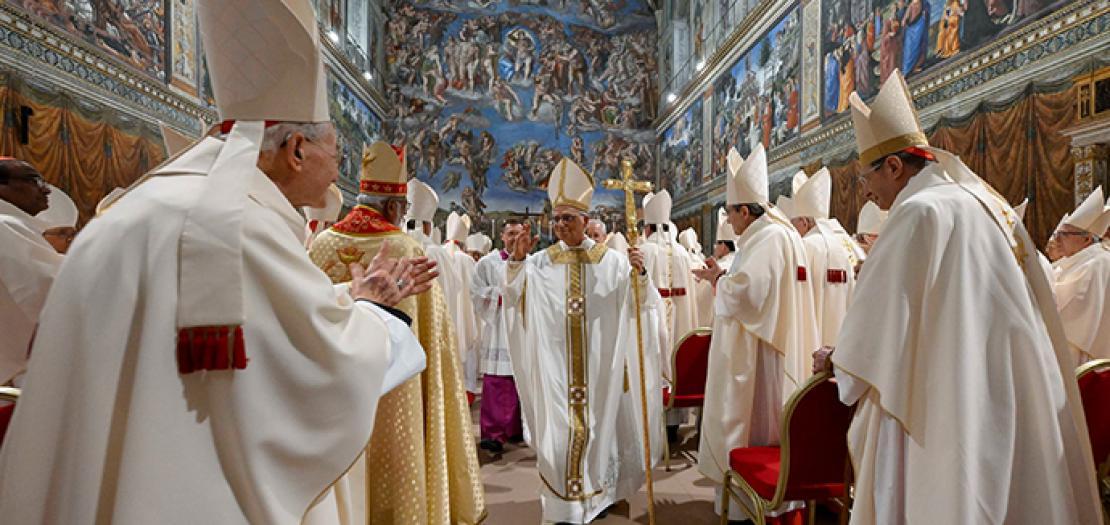Issued by the Catholic Center for Studies and Media - Jordan. Editor-in-chief Fr. Rif'at Bader - موقع أبونا abouna.org
The new Pope Leo XIV
Cardinal Robert Francis Prevost takes us back to the 5th century, when Leo, known as "the Great," was Pope of Rome and Pontiff of the Catholic Church, namely the 45th successor of Saint Peter. He was distinguished by his teachings and intelligence, as his teachings are recited on Christmas Eve to all believers in all churches worldwide.
Yet, he also took us back to the last Pope to bear the name Leo, namely to the end of the 19th century and the onset of the 20th century, when Pope Leo XIII opened the new centenary to the faithful in 1900. This Pope was renowned by his teachings on freedoms and social justice. Actually, the Church's social teachings are traced back to him as they are being taught nowadays, starting with his pastoral letter "Rerum Novarum", reflecting on modern affairs. He was the first Pope to write an encyclical on the developments in social life in which he defended workers' rights, social justice, unions, and women's rights, as well as on the Church's view on politics and its relevant affairs.
When the new Pope Leo XIV takes this name, he intends to continue the procession referred to as social work, or rather the social teaching of the Church. With the first words he uttered, he wanted to say, "Peace, peace be with you." It is an Easter greeting spoken by Lord Jesus Christ after His Resurrection from the dead. He also focused on justice and peace in his first address. The peace he spoke about implies unarmed peace, namely the unarmed peace that Lord Jesus Christ aspires for the world of today.
It is very impressive that the new Pontiff begins his papal message with a call for peace, as well as for building bridges and dialogue, which has also been repeated several times. We are actually on the threshold of witnessing a new era, that sets the bases for a renewed teaching for the Church, as well as on means to address generations including scientific and technological progress. Since as was the case with Pope Leo XIII who faced the challenges of his time, including the ideologies that were emerging at the beginning of the 20th century, so does Pope Leo XIV find himself facing the challenges of the age we live, namely the age of artificial intelligence which the Church seeks to address its people and its users while wanting to have a say on means to preserve respect for human dignity, without allowing machines, technology, and scientific progress to dominate humanity, its freedom, and its dignity. What the new Pope wants is to condone the technical and technological progress, as well as the moral progress in the use of this technology in the world of today.
The message from the new Pope is clear and explicit which implies fulfillment of what his predecessors started which includes the late Pope Francis--with his kindness and openness--as well as all the popes of the 20th century and the 21st century. It is a message that complements the Church's journey, presence, effectiveness, and moral influence. This is reminiscent of what Pope John Paul II stated at Amman Airport 25 years ago: "The Church does not deny that its primary duty is a spiritual one, but it is ready to cooperate with all segments of society to promote human dignity."
From a Jordanian point of view, we are hopeful that this election would contribute to strengthening the distinguished Jordanian-Vatican relations that have existed since their establishment in 1994. His Majesty King Abdullah II Ibn Al Hussein's congratulatory message to His Holiness the Pope indicates as well Jordan's openness to strengthening relations between the two friendly countries, as well as promoting interfaith dialogue, which our beloved King has always emphasized and continues to do so.
O ship of St. Peter proceed, and we pray that it will complete your journey, so that the Church may always be at the service not only of the Catholic Church, but also of every person of good will.







